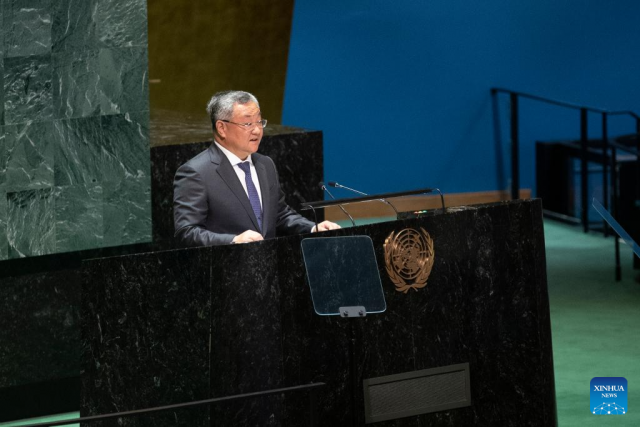UNGA adopts China-backed resolution to boost global AI capacity-building
Resolution aims for inclusive, sustainable AI development to support UN's 2030 Sustainable Development Agenda.

The 78th session of the UN General Assembly (UNGA) on Monday unanimously adopted the resolution, proposed by China and co-sponsored by over 140 countries, on strengthening international cooperation in the capacity building of artificial intelligence (AI).
The resolution on "Enhancing International Cooperation on Capacity-building of Artificial Intelligence" emphasizes that the development of artificial intelligence should adhere to "the principles of being human-centered," promoting beneficial intelligence, and benefiting humanity.
It encourages international cooperation and practical actions to help countries, especially developing countries, strengthen their AI capacity building, enhance their representation and voice in global AI governance, advocate for "an open, fair, and non-discriminatory business environment," and support the United Nations in playing a central role in international cooperation.
The resolution aims to achieve inclusive, beneficial, and sustainable development of artificial intelligence, thereby contributing to the realization of the United Nations' 2030 Agenda for Sustainable Development.
China's permanent representative to the United Nations, Fu Cong, stated while introducing the draft resolution at the General Assembly plenary session that the rapid development of global AI technology is having a profound impact on the economic and social development of countries and the progress of human civilization.
However, most countries, especially developing ones, have yet to truly access, use, and benefit from AI, and the global digital divide continues to widen, he noted.
"Many UN member states widely anticipate strengthening international cooperation on AI capacity building, developing and utilizing AI technology equally, and sharing the knowledge and achievements of AI," he said.
Fu noted that this resolution focuses on AI capacity building, proposing a series of significant and practical measures to strengthen related international cooperation.
"The goal is to help all countries, especially developing ones, equally benefit from AI development, bridge the digital divide, improve global AI governance, and accelerate the implementation of the 2030 Agenda for Sustainable Development," said the ambassador.
"The unanimous adoption of the resolution indicates broad agreement among member states to enhance global AI governance through dialogue and cooperation, fully demonstrating China's responsible attitude and leading role in AI development and governance," said Fu.
The ambassador added that China looks forward to using the adoption of this resolution as an opportunity "to actively promote its subsequent implementation with the broad membership," adhering to development priorities, being human-centered, ensuring equality and mutual benefit, and upholding innovation.
"China aims to help developing countries strengthen AI capacity building with practical actions, promote sustainable development empowered by AI, enhance the common well-being of humanity, and contribute to building a community with a shared future for mankind," he said.
A spokesperson of the Chinese permanent mission to the United Nations stated that UN member states, especially developing countries, warmly welcomed the unanimous adoption of the resolution and highly appreciated China's leadership role in promoting global AI cooperation and governance, as well as accelerating the implementation of the 2030 Agenda.
They unanimously agreed that the resolution's focus on AI capacity building and its series of practical measures are of significant milestone importance in bridging the global digital divide and promoting the shared benefits of AI development among countries, he said.
The spokesperson also mentioned that in October 2023, the Chinese leader announced the Global AI Governance Initiative, which provides direction for global AI development and governance.
As the UN's first resolution on international cooperation in AI capacity building, it fully reflects the core essence of the Global AI Governance Initiative and the Global Development Initiative. It meets "the eager expectations" of the broad membership, especially developing countries, and "demonstrates strong support for multilateralism and the United Nations," the spokesperson said.
"It is another major step in practicing the concept of a community with a shared future for mankind on the UN platform," the spokesperson noted.



















COMMENTS
Comments are moderated and generally will be posted if they are on-topic and not abusive.
For more information, please see our Comments FAQ